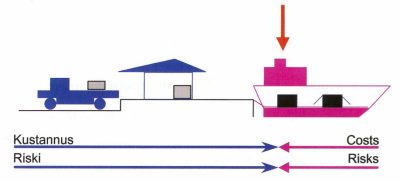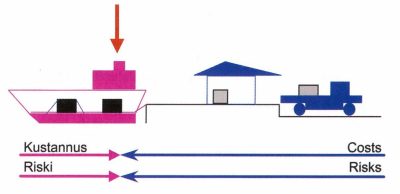Shipping terms, Ship Term
Ship Term, loading
This Shipping Term can be used for all methods of cargo handling when the Contracting Shipper hands over the goods in the port of loading by delivering them on board the Carrier’s vessel, to be transported by the Carrier.
| Division of costs and risks -- Kustannusten ja riskien jakautuminen | Ship Term -- Laivaehto |
|---|---|
 | Ship Term, loading -- Laivaehto, lastaus |
| Ship Term, loading: The Contracting Shipper | Ship Term, loading: The Carrier |
|---|---|
1 Delivering the goods to the Carrier The Contracting Shipper delivers the goods on board a vessel in the agreed port at the time stipulated. The Contracting Shipper hands over the goods when he delivers the goods on board the vessel in the place or in the manner agreed by the Carrier and the Contracting Shipper. The Contracting Shipper can deliver the goods
in accordance with the contract between the Contracting Shipper and the Carrier. | 2 Taking delivery of the goods from the Contracting Shipper The Carrier takes delivery of the goods on board a vessel in the agreed port at the time stipulated. The Carrier receives the goods when the Contracting Shipper delivers the goods on board the vessel in the place or in the manner agreed by the Carrier and the Contracting Shipper. |
3 Division of costs The Contracting Shipper bears all costs of delivering the goods in accordance with 1. Should the Contracting Shipper fail to deliver the goods in accordance with 1 or should he fail to fulfil the obligations defined in 7, he is liable for all direct costs thereby incurred to the Carrier. | 4 Division of costs The Carrier bears all costs after he has received the goods in accordance with 2. Should the Carrier fail to take delivery of the goods in accordance with 2 or should he fail to fulfill the obligations defined in 8, he is liable for all direct costs thereby incurred to the Contracting Shipper. |
5 Division of liability The Contracting Shipper bears all liability for loss of or damage to the goods until he has handed them over in accordance with 1. | 6 Division of liability The Carrier bears all liability for loss of or damage to the goods after he has received them in accordance with 2. Should the Carrier fail to take delivery of the goods in accordance with 2, he bears all liability for loss of or damage thereby incurred, to the goods. |
7 Other obligations The Contracting Shipper must give the Carrier sufficient information of the goods, and of their delivery, in due time before the delivery. The goods must be suitably packed and marked so that they can be handled in a normal way and be identified as the contract goods. | 8 Other obligations The Carrier must give the Contracting Shipper, in due time, notice as to when the goods must be on board the vessel. The Carrier must give the Contracting Shipper instructions on how to stow, secure and lash the cargo, if these activities are to be carried out by the Contracting Shipper. The Carrier must prepare the place of loading in the vessel for the conventional manner of taking delivery and stowing the cargo according to the information given by the Contracting Shipper. |
Ship Term, discharge
This Shipping Term can be used for all methods of cargo handling when the Carrier hands the goods over to the Consignee in the port of discharge, to be discharged from the vessel.
| Division of costs and risks -- Kustannusten ja riskien jakautuminen | Ship Term - Laivaehto |
|---|---|
 | Ship Term, discharge -- Laivaehto, purkaus |
| Ship Term, discharge: The Carrier | Ship Term, discharge: The Consignee |
|---|---|
1 Delivering the goods to the Consignee The Carrier delivers the goods at the time stipulated to the place agreed in the port of discharge so that they can be discharged from the vessel. The Carrier hands the goods over to the Consignee when the goods are in the port of discharge ready to be discharged from the vessel. | 2 Taking delivery of the goods from the Carrier The Consignee takes delivery of the goods at the time stipulated in the port of discharge so that they can be discharged from the vessel. The Consignee receives the goods when the goods are in the port of discharge ready for the Consignee to unload them from the vessel. |
3 Division of costs The Carrier bears all costs of delivering the goods in accordance with 1. Should the Carrier fail to deliver the goods in accordance with 1 or should he fail to fulfil the obligations defined in 7, he is liable for all direct costs thereby incurred to the Consignee. | 4 Division of costs The Consignee bears all costs of taking delivery of the goods after he has received them in accordance with 2. These costs include unfastening the goods, moving them within the vessel, removing all the fastening material which does not belong to the Carrier and other similar costs of discharge. Should the Consignee fail to take delivery of the goods in accordance with 2 or should he fail to fulfil the obligations defined in 8, he is liable for all direct costs thereby incurred to the Carrier. |
5 Division of liability The Carrier bears all liability for loss of or damage to the goods until he has handed them over in accordance with 1. | 6 Division of liability The Consignee bears all liability for loss of or damage to the goods after he has received them in accordance with 2. Should the Consignee fail to take delivery of the goods in accordance with 2 or should he fail to fulfil the obligations defined in 8, he bears all liability thereby incurred, for loss of or damage to the goods. |
7 Other obligations The Carrier must give the information necessary for taking delivery of the goods in due time before the delivery. The information must be given to the person named by the Contracting Shipper. If the Carrier is unable to give this information to the named person, he can give it to the owner of the cargo, or, if he does not know who is the owner, to the Contracting Shipper. The Carrier must indicate the berth to the person defined in this paragraph and give him notice as to when he can discharge the goods from the vessel. | 8 Other obligations The Consignee must seek the information relating to the place and time of discharging the vessel from the Carrier in due time. The Consignee must discharge the goods without any delay, especially to the vessel. |